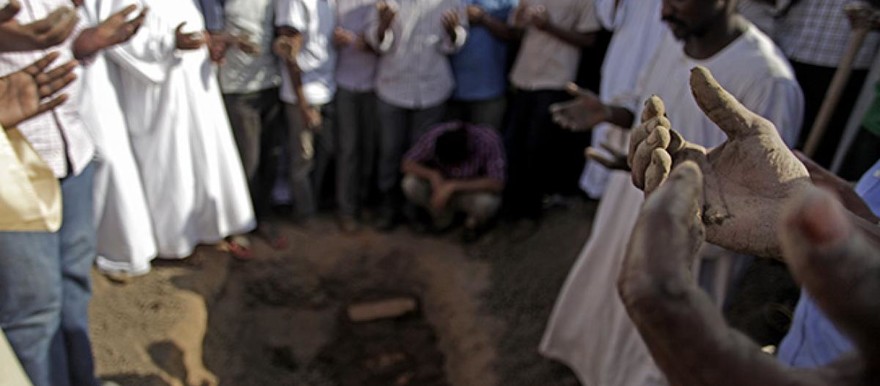A Joint report by the African Centre for Justice and Peace Studies (ACJPS), Amnesty International, and Human Rights Watch released today said Sudanese authorities have yet to provide justice to victims of a violent crackdown on anti-austerity protesters in Khartoum in September 2013.
“Although it seems like Sudan has succeeded in sweeping the horrific violence of September 2013 under the carpet, victim families’ still demand justice,” said Mossaad Mohamed Ali, executive director at ACJPS. “The UN Human Rights Council, currently holding a session on Sudan, should press Sudan to hold those responsible to account for the appalling bloodshed on the streets of Khartoum and other towns, and provide meaningful justice to victims of killings, assaults and other abuses.”
Sudanese authorities, according to the report, responded with a violent crackdown to large-scale protests that swept the country following the announcement of austerity measures on September 22, 2013, with security forces and armed men allied to them using live ammunition, tear gas, and batons. As many as 185 protesters and other civilians were killed, most of them shot in the head or chest, ACJPS and Amnesty International found in a joint study published in September 2014. Hundreds were injured and more than 800 others arrested, some held for weeks. Human Rights Watch research showed that many detainees were subjected to torture and other ill-treatment, that many journalists and human rights defenders were beaten, and those female protesters were sexually assaulted by security forces.
Although Sudan established three state commissions of inquiry, no findings have been made public. All attempts to gain access to the findings have been unsuccessful. In September 2014, the United Nations independent expert on Sudan stated that the information provided by the government “does not provide evidence of a thorough and independent investigation.”
In November 2015, a Justice Ministry official announced that an investigation by the ministry had found that just 86 protesters were killed and that four security officers had been arrested in connection with these deaths. Many victims’ families have tried to bring private prosecutions, but the groups know of no prosecutions that have concluded. The groups know of only one case – involving the killing of a pharmacist, Sarah Abdelbagi, who was shot outside her home in Omdurman during the protest – that advanced to trial. A policeman was convicted of her murder, but his conviction was overturned on appeal in May 2014 for lack of evidence.
“The government’s response has been to deny the scale of the violence and to claim that there is not sufficient evidence to identify and prosecute the attackers, a response that denies the victims’ rights and encourages impunity,” said Daniel Bekele, Africa director at Human Rights Watch. “The government needs to publicly admit the scale of the killings and the role of its security forces.”
Sudan’s Ministry of Justice has attempted to settle cases by paying money (diya) to the families of the 86 victims identified in government investigations, which would be an insufficient remedy for these violations and would not constitute a sufficient guarantee of non-repetition. The government has failed to ensure full, thorough, and effective investigations and prosecutions of those responsible for the killings. Even where investigations have proceeded and prosecutions are pending, in around 16 cases, a patchwork of immunities protect security and law enforcement officers from criminal prosecution, posing additional hurdles to justice.
“The September 2013 crackdown remains an ugly symbol of Sudan’s use of lethal force against peaceful protesters, and the lack of accountability for human rights abuses,” said Sarah Jackson, deputy regional director at Amnesty International. “Human Rights Council member states currently considering Sudan’s appalling rights record should loudly push the country to take victims’ rights seriously.”




